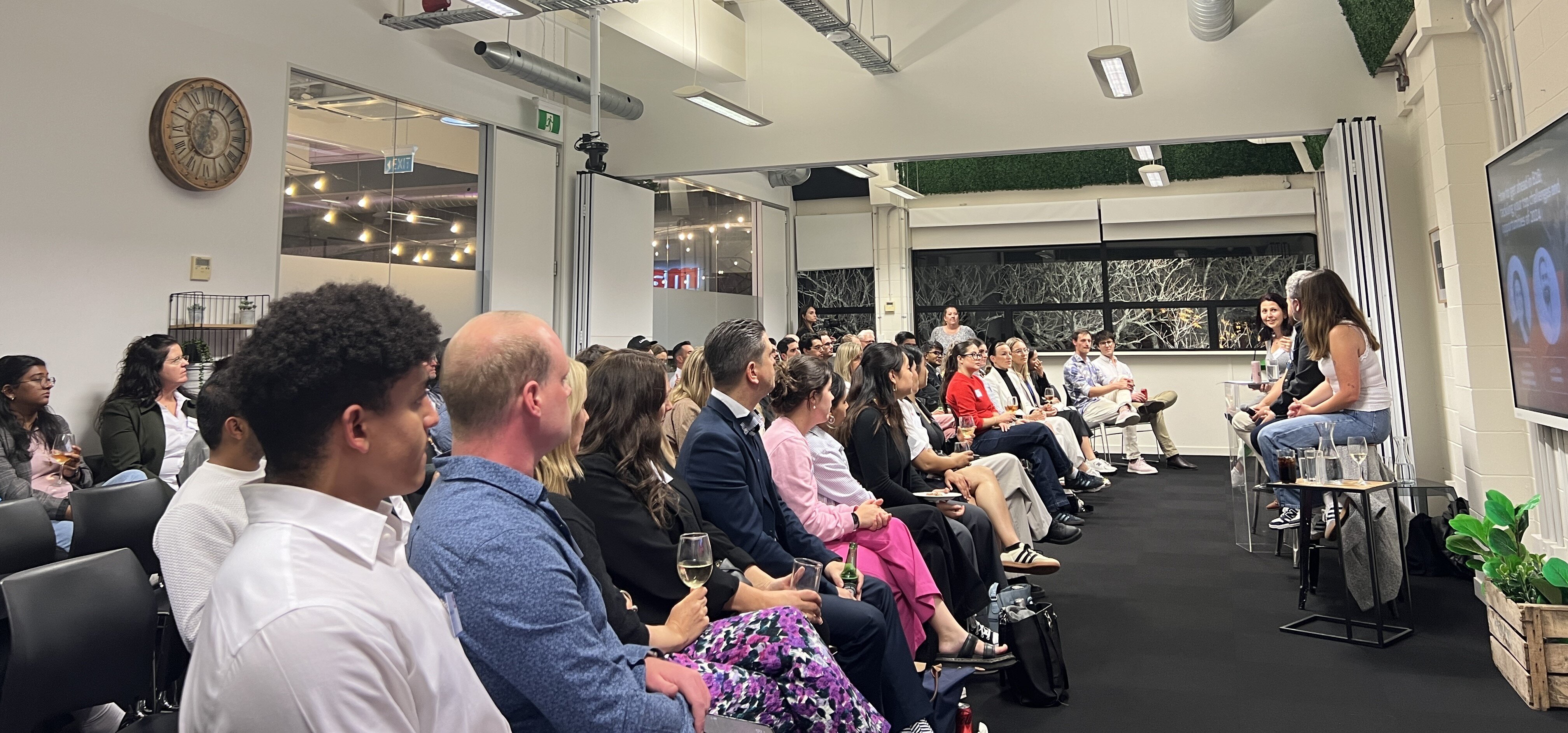
First Published: 13 May, 2024
On April 30th, the Marketing Association and the B2B Special Interest Group hosted a dynamic panel discussion, focusing on strategies related to ‘how to get ahead in B2B marketing.’ The panel discussed several topics highlighting the challenges faced within the industry, including:
• Prioritising workload and proving ROI
• Driving brand awareness in B2B
• Building personal reputations and networks
The A-team behind this panel comprised of Concentrate’s own Gavin Gilbert, Marketing Account Manager, Korey Rubenstein, Community Director at kiwiSaaS Community and Adjunct Lecturer at the University of Waikato, and Molly Lawrence from Tonkin + Taylor. The discussion was expertly moderated by PJ Morris from Fletcher Building’s Concrete Division.
The room buzzed with diverse perspectives and experience, reflecting the varied expertise levels present. PJ noted that “it was wonderful to see students in the audience and the engagement from the academics to bring B2B to the classroom”. Questions spanned across the different facets of business, concluding during the Q&A session. PJ Morris observed that the alignment among speakers was evident; while each offered a unique take or approach it was clear that the fundamentals of marketing are important to success in B2B.
Prioritising workload and proving ROI
Gavin shared valuable insights on ensuring ROI and managing workload prioritisation. He stressed the importance of aligning our strategies with company goals, emphasing, “Ensuring your strategies drive ROI across brand awareness, lead gen, and demand gen campaigns is about being clear on what your goal is and how it connects with the company goals.” Gavin highlighted the potential to drive tangible business outcomes and deliver measurble ROI, and emphasised the necessity of facilitaing cross-departmental conversations to translate insights into actional strategies. By encouraging open communication and collaboration across teams, marketers can translate insights into actionable strategies that drive sustainable growth and competitive advantage.
Driving brand awareness in B2B
Korey Rubenstein discussed ‘branding’ as it’s often overlooked in B2B, attributing it to a strong focus on short term sales activation activities. He emphasised the evolving landscapes of business, where brand is becoming the focus due to the need for creating a sustainable competitive advantage. He said: “I adhere to the belief that there are only three market-facing sources of Sustainable Competitive Advantage (SCA) - brands, offerings, relationships. This doesn't mean that ‘brand’ is the only investment made in SCA and it may not even be the dominant player for all manner of business. But it certainly cannot be ignored to differentiate your offering.”
Shifting for just awareness, Korey challenged the common fixation on brand visibility, highlighting the necessity of it in navigating the brand building hierarchy. He stressed, “It’s logical but if the ICP (Ideal Customer Profile) isn't aware of your brand/offering, then you simply do not exist to them.” He advocated for a shift towards a more hands-off, self-serve business model, underlining the importance of integrating each stage within the overarching marketing strategy. PJ Morris added that our customers are people just like us, and if we don’t have an understanding neither will they.
Addressing the challenges of securing buy-in from senior management for brand investments, Korey recommended aligning pitch with decision-making factors, whether data-driven or narrative-based. He suggested resources such as the Harvard Business Review for a guide on ‘Making the Business Case for Your Marketing Budget’.
Highlighting the significance of an elevator pitch in brand communication, Korey emphasised its role in fostering a unified understanding of brand within the organisation. He suggested an exercise - individually conducting elevator pitches from senior management to gauge brand cohesion and clarity.
Lastly, Korey stressed the criticality of measurement in brand investment, stating, “You can’t manage what you can’t measure”. He recommended exploring brand tracking methodologies like those utilised by NZ Grown for an effective analysis of marketing return on investment (MROI). He also advocated for a focus on starting with CLV Customer Lifetime Value (CLV) maximisation, citing a podcast by Peter Fader on CLV Maximisation or V. Kumar’s CLV textbook for a comprehensive understanding.
Building personal reputation and network
Molly Lawrence provided a fresh perspective as a young marketer, offering her thoughts on how to approach building a personal reputation. She emphasised the significance of practice engagement, urging young marketer to step out of their comfort zones and actively cultivate their personal brand. She highlighted the importance of seizing opportunities to network, suggesting that reaching out to industry professionals for informal coffee meetings can be an effective way to learn and establish rapport.
Korey echoed Molly’s sentiment, emphasising the importance of importance of accountability in network building. He underscores the need for integrity and reliability, emphasising that consistency in actions is key to cultivating lasting professional relationships.
Insights gleaned from this panel underscored that the journey to success in B2B marketing is multifaceted and ever evolving. By embracing collaboration, innovation, and continuous learning, marketers can navigate the complexities of the industry and carve out a path towards sustained growth and excellence.
Key Takeaways from the Panellists:
We hope you enjoyed this write-up! And we hope to welcome you to future Monthly Marketing Meetup events.
Written by Shaylee Sinclair, Concentrate.
Checkout the video below of the night, a huge thanks to Attain for creating this video.
Category

Contact us if you have any suggestions on resources you would like to see more of, or if you have something you think would benefit our members.
Get in TouchSign up to receive updates on events, training and more from the MA.
